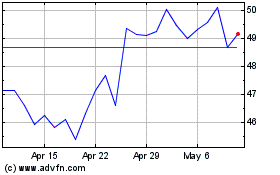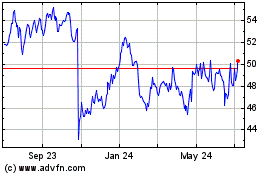Sanofi Investors Count Cost of Praluent Ruling -- Update
January 06 2017 - 2:29PM
Dow Jones News
By Denise Roland
A ruling by a U.S. judge blocking the sale of Sanofi SA's new
cholesterol-lowering drug dealt a fresh blow to the French
pharmaceuticals giant as it scrambles to make up for falling sales
of a separate, best-selling medicine.
Sanofi shares ended down more than 2% Friday afternoon, a day
after the U.S. District Court of Delaware issued an injunction
against the sale of the drug. The judge ruled Sanofi and partner
Regeneron Pharmaceuticals Inc. infringed on a patent held by rival
Amgen Inc. for its own, new cholesterol drug.
Regeneron shares were down more sharply, 7% lower in midday
trading Friday. Amgen shares were up more than 3%.
Sanofi and Regeneron have said they would appeal the ruling,
allowing them to continue selling the drug, called Praluent, for
now. The appeal process can take anywhere from a few months to more
than a year, giving Sanofi some breathing room.
The two can also settle with Amgen, a move the judge in the case
encouraged in her ruling Thursday. Such a settlement often involves
agreeing to pay royalties. That could lessen the sting for Sanofi.
Still, the legal setback remains a big disappointment for one of
its most promising new drugs.
Both Praluent and Amgen's Repatha belong to a new class of
cholesterol-lowering medicines known as PCSK9s. They were approved
within weeks of each other in 2015.
Sanofi has been leaning heavily on Praluent and a clutch of
other recently launched drugs to offset a sharp decline in sales
from its best-selling insulin medication Lantus. U.S.
pharmacy-benefit managers, who negotiate drug prices on behalf of
health insurers and employers, have succeeded in winning steep
discounts from Sanofi on Lantus. Meanwhile, a biosimilar version of
Lantus made by Eli Lilly and Co. and poised to launch in the U.S.
this year is expected to cut into sales. Biosimilars are close, but
not exact, copies of drugs manufactured using living cells.
Before the ruling, analysts expected Praluent could eventually
generate around $3 billion a year globally for the two drugmakers.
Praluent's U.S. sales alone were forecast to hit $2 billion or
higher by 2020.
Karen Linehan, Sanofi's general counsel, said the company
believed Amgen's patent claims are invalid, and that ending the
sale of Praluent in the U.S. would go against the best interest of
patients.
Amgen said it was pleased with the decision and will strive to
make a "smooth transition" for patients who choose to switch to its
drug.
The stakes are also high for Regeneron, for which Praluent was
considered a potentially large source of growth. Still, the
company's top-selling product, the eye drug Eylea, accounts for
nearly all revenue, and Regeneron is counting even more heavily on
an eczema drug, Dupixent, awaiting approval in the U.S. than on
Praluent.
"The company is looking forward to a very important year with
multiple drug launches, most importantly Dupixent," a Regeneron
spokeswoman said.
Its legal woes aside, Praluent hasn't lived up to its initial
promise. Both it and Repatha have struggled to gain momentum in the
U.S. market, in part because the PCSK9s have yet to prove that they
are more effective at reducing the risk of heart attack, stroke and
other serious cardiovascular problems than the much less costly
statins.
Sanofi is running a large clinical trial that it hopes will show
Praluent significantly lowers cardiovascular risk compared with
statins, a move aimed at driving higher demand for the drug.
Write to Denise Roland at Denise.Roland@wsj.com
(END) Dow Jones Newswires
January 06, 2017 14:14 ET (19:14 GMT)
Copyright (c) 2017 Dow Jones & Company, Inc.
Sanofi (NASDAQ:SNY)
Historical Stock Chart
From Mar 2024 to Apr 2024

Sanofi (NASDAQ:SNY)
Historical Stock Chart
From Apr 2023 to Apr 2024
